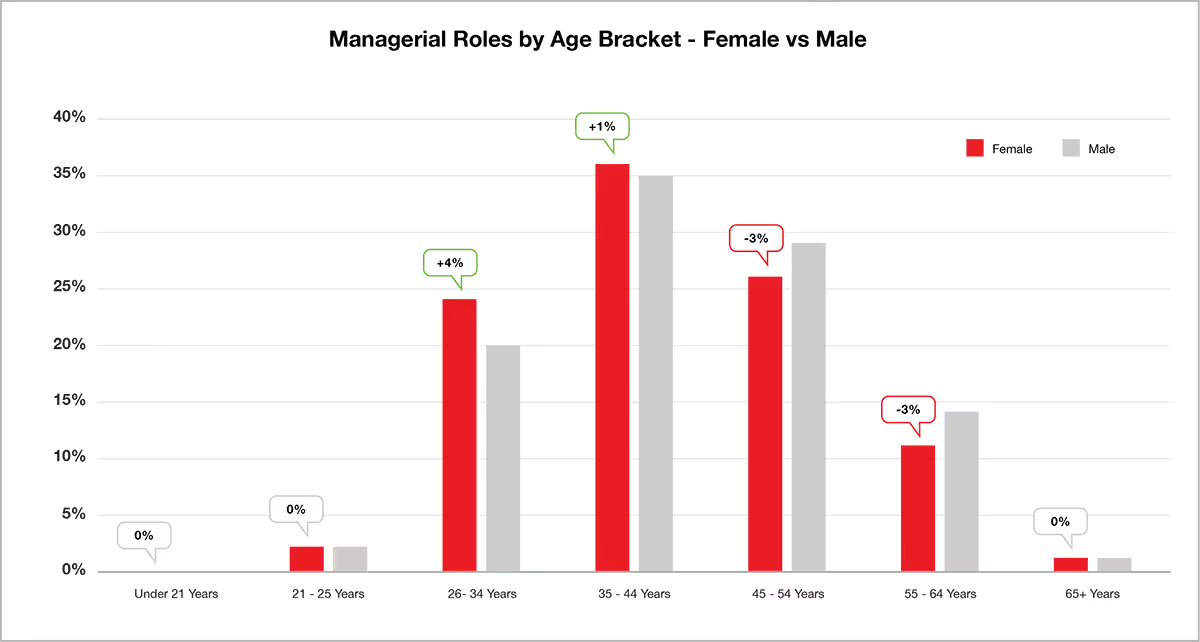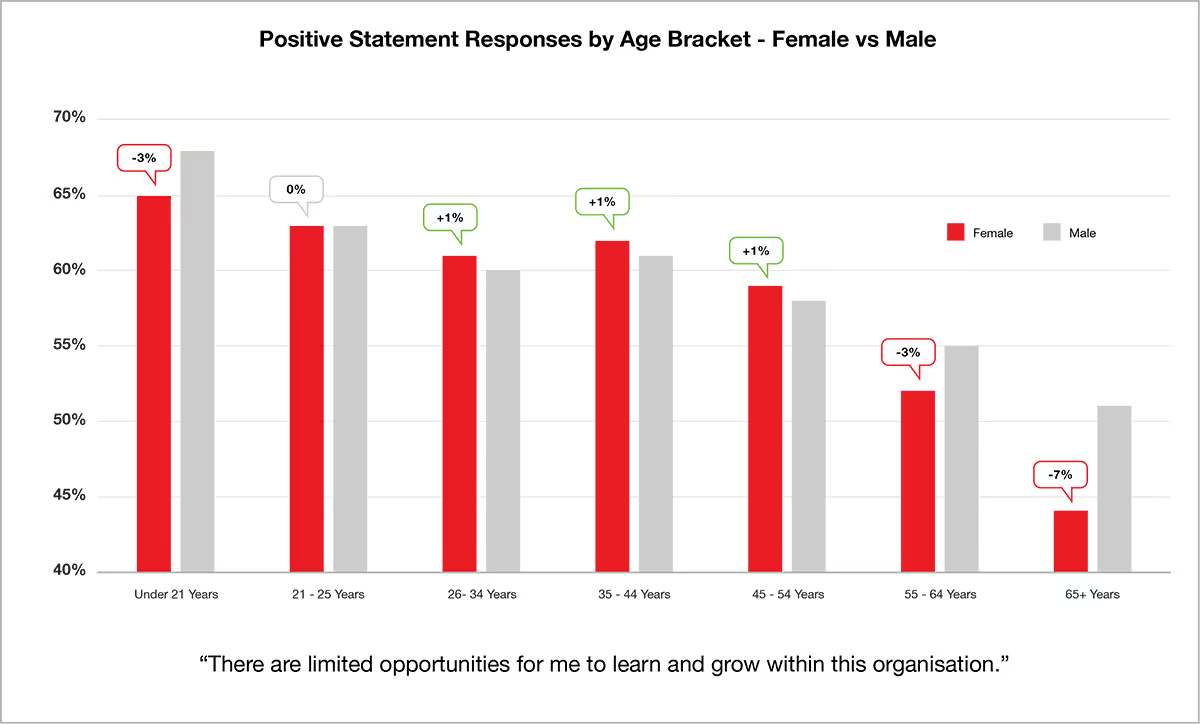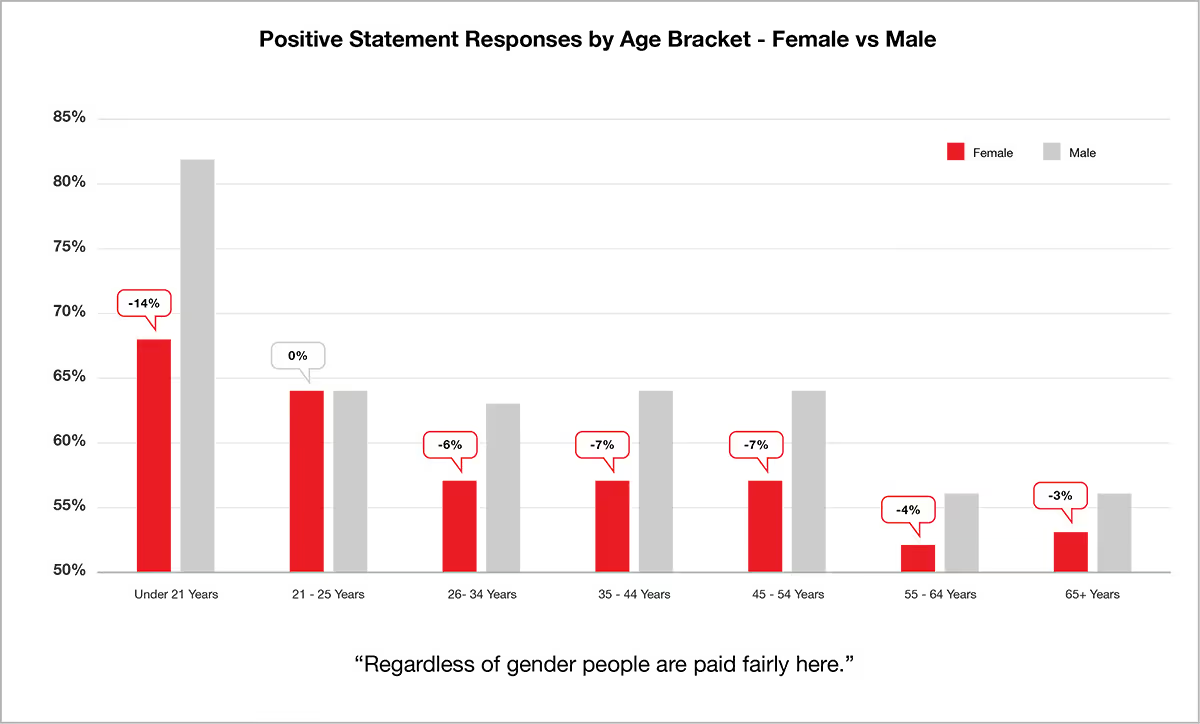
Catch up now

There can be no doubt that the Motherhood Penalty is a very real issue in the UK workplace in general. However, organisations in the Best Companies’ community are doing something quite different when it comes to supporting their female employees.
According to our data, women account for 46% of managerial roles in our community (compared to the UK average of 35%1). Furthermore, out of all surveyed women, 25% are in managerial roles compared to 32% of males (and compared to the UK average of 8%).
The fact that these companies are significantly outperforming the UK averages, suggests that organisations within the Best Companies community are getting closer to achieving a greater balance and less discrimination in the workplace.
The challenge then becomes: how can we close this gap even further?
One of the ways this can be done, our data implies, is by creating more opportunities for women to attain managerial roles regardless of their motherhood status.
Research shows that women who do not reach a managerial position before their first pregnancy are significantly less likely to achieve this type of role at all compared to men who become fathers2. Using data gathered from our Best Companies community, we can see that women tend to achieve managerial roles earlier in their careers than men. This means that female employees having to work harder at the beginning of their careers to reach leadership positions before they start a family.

The table above shows that in the 26-34 age category, women score four percentage points higher than men. This suggests a couple of things. Firstly, that women can reach manager positions more easily as they haven’t experienced the challenges of the Motherhood Penalty yet. And secondly, that women feel more pressured to progress into a managerial role to create a stronger career path before they start a family.
This is further evident in the next two age brackets. In the 35-44 bracket, we can see that the percentage scores for men and women is relatively even, though the female score is still one percentage point higher at 36% compared to the men’s 35%.
However, once we hit the 45-54 age bracket, there is a shift as males start to score higher, with 29% compared to females’ 26%.
If we look at the 35-44 and 45-54 age ranges combined, there is a 28% decrease in the number of female managers – a huge drop when compared to the fact that males also see a decrease here, but only by a much smaller 17%.
This drop-off suggests that women who don’t achieve a managerial position before having a child struggle to earn a promotion into this type of role afterwards.

Considering that the average age that a woman in the UK has their first child is 30.93 (and considering that there has been a pattern of steady increase to the first pregnancy age by 5 years since the 1938 average of 25.94), we can infer that women are having to make a choice between developing their career or starting a family – reflected by the fact that a higher percentage of women achieve managerial positions in the 26-34 age bracket when compared to men.
Furthermore, the drop off between the 35-44 and 45-54 age ranges can also be partially correlated with the average age of first pregnancy. This is because women who come back from their first pregnancy could be finding it difficult to get the opportunity to move into management.
Interestingly, while the data shows that age seems to be a factor in women reaching management positions, tenure isn’t. In fact, when we look at the percentage of people who achieve a managerial role by how long they had been at an organisation, there is no more than a one percentage point difference between men and women in every category (less than 6 months, 6 months, 1-2 years, 2-3 years, 3-5 years, 5-10 years, 10-15 years, 15+ years).
This suggests that it is not the level of experience or length of service that is affecting women’s ability to reach management positions, but something else. Perhaps there is a misconception that once a woman has been away from work due to maternity leave, she has ‘fallen behind’ her colleagues in terms of knowledge and, therefore, could be overlooked when promotions become available.
Organisations need to ensure that they are creating fair promotional opportunities for women based on their skills and not allowing their motherhood status to be an influence.
Another thing that organisations need to focus on is creating more opportunities for personal growth for women as they become more experienced.
One of the statements on the Best Companies survey is, “There are limited opportunities for me to learn and grow within this organisation”. When we look at the data for this statement, it follows a similar pattern to what we saw in the previous table, with those within the 26-34 and 35-44 age ranges scoring slightly higher (one percentage point) than their male counterparts.
The issue starts to change once we reach the 55-65 and 65+ age brackets where women score three and seven percentage points lower than men.

This shows that as women get to the later stages of their career, they are provided with less opportunities for progression than men.
As such, organisations need to place some focus on provisioning training and development for women, regardless of their age.
Furthermore, organisations can help to close the gender gap is through ensuring equal pay for people in the same or similar roles, whether they are male or female.
Through our data for the survey statement, “Regardless of gender people are paid fairly here” the average woman feels there is an inconsistency between their wages when compared to male colleagues.

From the chart above, we can see that that, for this statement, women consistently score below men. Only in the 21-25 age group do both male and female score the same. In particular, the age ranges of under 21 (14 percentage points difference), 26-34 (six percentage points), and 35-44 (seven percentage points) have the largest gap between positive responses.
Despite women reaching managerial roles at a younger average age than men, this data suggests that there is a perception that they are still not as well paid for these positions as men.
Organisations need to ensure that people are paid fairly for their role, regardless of gender. Those that already do this may need to adopt a more open wage structure so that employees can see that their remuneration is competitive with their colleagues.
The Motherhood Penalty is undeniably an issue that many organisations across the UK need to address. However, there is evidence that some have already begun to take the necessary steps to tackle this problem. Within the Best Companies community, there are multiple examples of organisations that have prioritised supporting their female workforce, ensuring fair pay and opportunities for all, including those who choose to start a family.
One example of this is at modern Indian restaurant chain, Mowgli. At Mowgli, a 3-Star Accredited organisation, 43% of managerial positions are held by women – significantly higher than the UK average of 35%. Abby Mellors, Head of HR & Recruitment at Mowgli, spoke about the organisation’s approach to beating the Motherhood Penalty.
“Having a senior leadership team, founder Nisha Katona and COO Lucy Worth, who themselves have juggled motherhood and careers is a great source of comfort for women in our business but also allows us to truly understand how to support new mothers in Mowgli,” she explained.

“We have created bespoke phased returns to help new mothers through this transitional period between home life and professional career. This includes flexible working to support childcare needs but also emotional welfare support through external coaching recognising that becoming a mother can be a big change in someone’s life - this has proved extremely beneficial for first-time mums. At Mowgli we truly celebrate motherhood and hold baby showers, welcome newborns with Mowgli baby boxes and provide anyone taking family leave with enhanced pay to ensure financial security and support.”
Another Best Companies-accredited organisation that is tackling the Motherhood Penalty prejudice is Ghyston. Women in this organisation make up 56% of managerial positions, an incredible 59% higher than the average for technology companies.
Regarding the best practice that the organisation has put in place to help new mothers, Emily Hill, CEO and Co-founder of Ghyston, said: “At Ghyston, there isn’t a straight line to the top that people need to follow. This is much a healthier progression process as people can do what they enjoy and are good at - which itself changes over time - and progress in ‘squiggly’ ways instead. We have policies that support women and carers: we offer flexible on working hours; operate a hybrid working model, which our staff really love; and we are part of the Nursery Workplace Scheme, as well as other government schemes for subsidised childcare.”
Furthermore, Sarah Bright, Human Resources Director at Axiological, spoke about her personal experiences of being a mother and the difficulties she faced at that time. “I’ve personally experienced a lack of understanding of the needs of working mothers and bias in career advancement decisions. This drives me to do better for others.
I can name several points in my career where I have found myself desperate to prove part time working can be successful and that I can still bring value to the organisation even though I have to leave to pick my child up from nursery and as a result I have experienced those feelings of ‘putting up’ with a situation at work and feeling powerless to address.”
She further highlighted the many practices that Axiologik had implemented to support her and other women in the workplace. “I am lucky that Axiologik believed in me and prioritise the employee experience. They not only embrace meaningful flexible working but give me a voice and a remit to really support our working mothers.
Axiologik have people policies that genuinely help but we trust our employees as adults to make the right decisions for their families and work commitments. For working mothers, we have a supportive return to work process that links returning mothers with mentors and networks to allow a safe space to share the sometimes-overwhelming invisible load and gain a sense of not being alone. We raise awareness internally around needs of working mothers and parent friendly social activities, the highlight being our summer family party, with magicians, slime, and balloon animals to arcade games for the older children.”
Moreover, marketing agency Big Group have proven how effective listening to employees and focusing on improving family benefits and flexible working allowances is to increasing retention.
Stephanie Burridge, People Director at Big Group, said: “We received feedback from employees in 2022 that our benefits were no longer competitive, and feedback that our maternity pay wasn’t enticing enough for women to want to stay working at Big Group. This was an important factor for women when they were thinking about starting a family and often decided to find an employer who offered better benefits. We took this on board and alongside a complete benefits review in 2022 we improved our family friendly benefits. We enhanced the pay and now offer 100% pay for 12 weeks followed by 50% for 6 weeks before SMP kicks in. We also offer a return-to-work bonus, £1500 split over 6 monthly payments and this is pro-rata, if the returner reduces their days on return”.

On 6th April this year, a new law came into effect known as the Employment Relations (Flexible Working) Act. This new legislation guarantees that all employees can make a formal flexible working request from their first day of employment (down from after 26 weeks of continuous service) and they can make these requests twice every 12 months (up from once per year).
This is particularly positive for women as statistics show that mothers who work full-time are almost 3 x more likely to ask for flexible working than full-time dads.5
Furthermore, when it comes to returning to work, 41% of single mothers request flexible working.
While this is certainly a step forward, it’s important that we recognise that this law doesn’t guarantee that the request will be accepted.
Worryingly, the data shows that 40% of women reported that their request was rejected. This data is from before the new law came into effect but reflects the fact that the law may not produce the desired results.
As such, it should be at the top of organisation’s agendas to support their employees by providing flexible working wherever possible.
It’s fantastic to see that organisations within the Best Companies Community are prioritising the creation of practices and networks to ensure that women receive fair treatment and opportunities, including when they take maternity leave.
It is vital that organisations across the UK recognise the importance that their female employees play in their success and make every effort to provide them with the support they need to thrive.
To do this, they need to focus on implementing structures that provide women with the opportunity to progress their careers and develop their skills, and that ensure a fair and equal environment regardless of gender or motherhood status.
Discover how your female employees feel about the opportunities and support available to them at your organisation by getting in touch today.